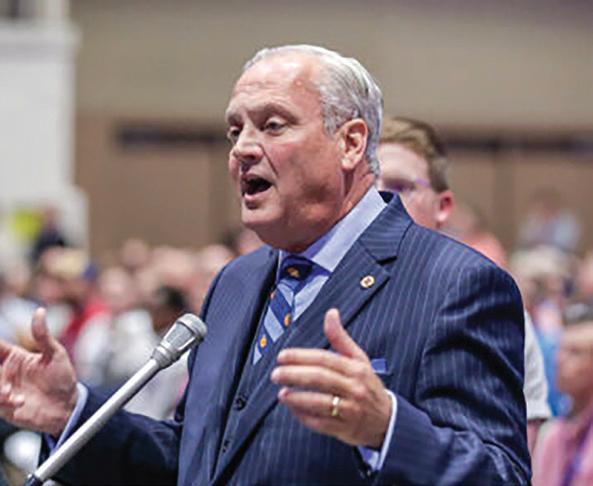
14 minute read
Dramatic moments and long-lasting actions
This is only round one on clarifying women’s roles and ‘friendly cooperation’
Messengers headed to New Orleans for the Southern Baptist Convention were anticipating some of the dramatic moments. Rick Warren would stand to defend the choice by the church he founded over 40 years ago to ordain three women as pastors and ask to be reinstated. The woman pastor of another church would do the same. Then messengers would decide whether to sustain a vote by the SBC Executive Committee (EC) in February to put those churches out of the convention or to let them back in. The big issues were whether the pastorate is reserved for men according to the Bible and SBC practice, and the broader definition of “friendly cooperation.”
Advertisement
These dismissals were a case study. But longerterm actions would come in other votes, if those motions ever made it to the floor.
Changing the constitution
Both candidates for SBC President had said they favored letting messengers vote on an amendment to the SBC constitution adding “men” to the definition of pastor, thereby disqualifying churches with female pastors from “friendly cooperation” as stated in the constitution. After Pastor Mike Law of Arlington, Virginia made the motion in 2022, it resided with the EC.
“We need to make it very clear where we stand,” EC member Todd Burgess of Alaska told his fellow trustees. The 86-member panel with 71 present in New Orleans was debating whether to bring the motion to the convention floor. Overall, it was said, the EC did not favor a constitutional amendment. Updating the denominational statement of faith, the Baptist Faith and Message (2000), seemed a more likely tactic to answer whether “pastor” in that document means senior pastor or any pastoral role, and whether women can hold any position with “pastor” in the title.
The EC debated sending the Law amendment to messengers, but said they did not favor that path- way for addressing the larger issue. Ultimately, the constitutional amendment went to the floor as written, without any judgments from the EC.
At the time of the floor vote, Colorado pastor Bob Bender spoke against the motion. “Southern Baptist brothers and sisters, I beg of you,” he said. “Do not do this. All the liberals have left us. It looks like we conservatives are left to fight amongst ourselves.” Women in associate pastoral roles need to be recognized for their contributions, Bender said.
Denny Burk from Louisville, Kentucky countered that the amendment “does nothing to diminish [women’s] calling and their work among us.” Burk is director of the Center for Gospel and Culture at Boyce College.
“We all believe they must be a part of the Great Commission,” he said. The amendment “is about how to apply our doctrinal statement to our cooperation when it comes to female pastors.”
During the course of the debate, messengers heard varying reports on the numbers of women in pastoral roles from Law and others. One website, American Reformer, said there are 111 women senior pastors in SBC churches, although other SBC sources have said the number is closer to 50.
The number of women who hold associate pastor roles or other non-senior pastor positions was said to be about 1,800 but that count is not official.
Messengers passed the constitutional amendment by more than two-thirds margin.
“I am grateful to Southern Baptists for standing on Scripture,” Law tweeted.
But that is only round one. A constitutional amendment requires a second reading and two-thirds vote. That will happen at the 2024 SBC in Indianapolis.
High drama
The dramatic moments that set up the vote on the Law amendment and forecast its passage came on the first day.
“If you think every Baptist thinks like you, you’re mistaken,” retired Saddleback Church pastor Rick Warren said in an emotional appeal to let his church back into the Convention.
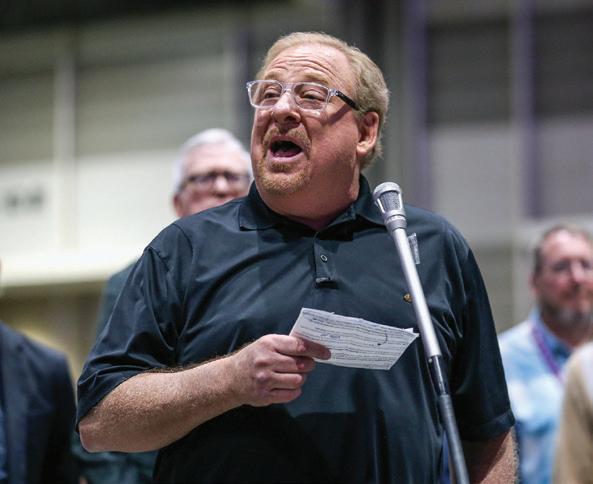
Saddleback was one of six churches dismissed for “lack of friendly cooperation” with
Tweets on a memorable election

“As the #SBC23 votes for a president this afternoon, here is the dividing line. If you think all is well in the SBC and we can keep going in the same direction, vote Bart Barber. If you think the SBC trajectory is ‘unsustainable’ and in need of life support, vote Mike Stone.”
– David Schrock, Woodbridge, Virginia
“@bartbarber is God’s man for the hour. As @AdrianRogers said he is “3 feet to the yard and 12 inches to the foot.” He represents the best of what Southern Baptists are...humble, holy and happy in the Lord.” the denomination by the EC in February. Three chose to appeal.
Linda Barnes Popham, the pastor of Fern Creek Baptist Church in Louisville, Kentucky appealed her church’s ouster. “Why now?” she asked, after 33 years pastoring in the town that is home to The Southern Baptist Theological Seminary.
Each church was given three minutes to state its case.
Warren traced differences that the denomination has previously allowed over theological issues, and he sought to add women as pastors to the list. “No one is asking any Southern Baptist to change their theology,” Warren said.
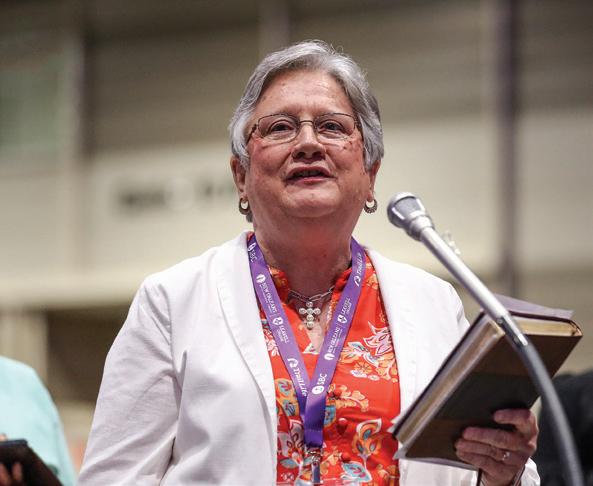
“I’m not asking you to agree with my church. I am asking you to act like Southern Baptists who have historically agreed to disagree on dozens of doctrines in order to share a common mission.”
Warren said he only disagreed with one word in the Baptist Baith and Message: “men” as it limits the qualifications for pastor. “Why should this one issue cancel our fellowship?” Warren asked.
Warren’s acceptance of this theological position is recent. He said he was convinced by the Great Commission in Matthew 28. Everyone is sent to preach, teach, baptize, and make disciples, he contends.
Popham delivered a similar, perhaps more impassioned plea. “We’re not here to convince any of you to let your church have women pastors; that’s not the issue here,” she said.
Popham pointed out several issues where churches have been allowed their own opinions, including Calvinism and Covid closures. “I don’t agree with you, but I don’t want to kick you out of the family,” Popham said. “We want to partner together to share the good news to the ends of the earth.”
Both Warren and Popham exceeded their time limits and their mics were cut off.
In both cases, Southern Seminary President Al Mohler was appointed by the EC to bring its response. Mohler spoke briefly to the theology of women as pastors, but mostly he pointed to “lack of friendly cooperation.”
“It is the responsibility of the Southern Baptist Convention to understand what it means for a church to be in friendly cooperation with this convention,” Mohler said. “This is an essential
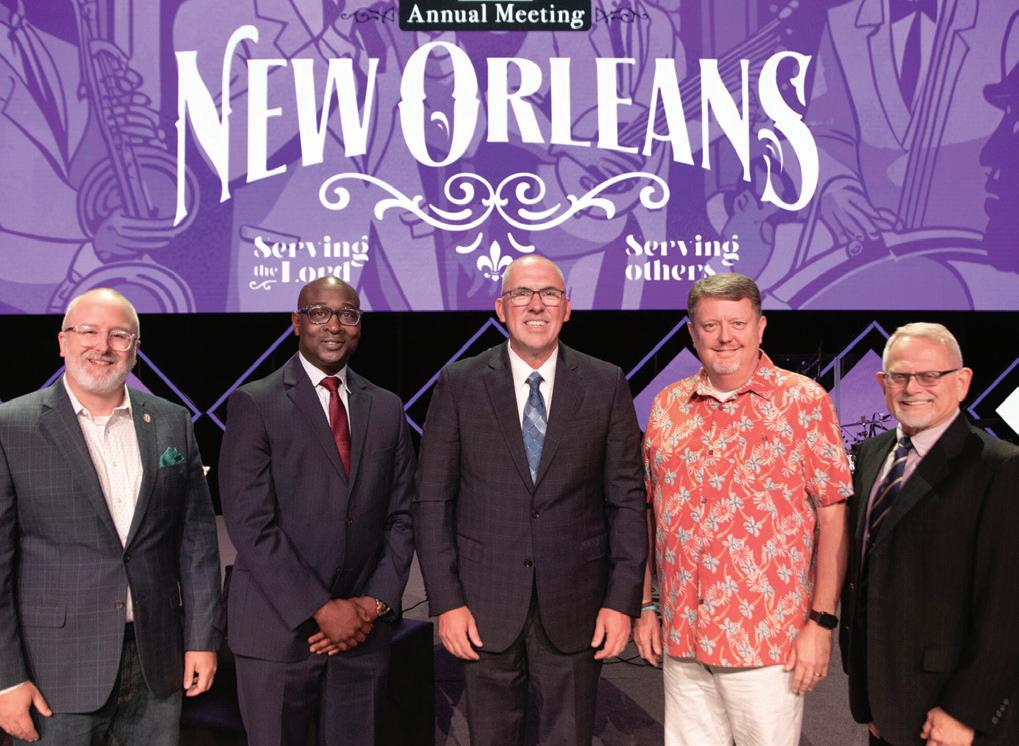
“The 68%-31% victory by @bartbarber is a clear signal of where Southern Baptists are: committed to our mission and committed to unity.”
– Phillip Bethancourt, College Station, Texas part of our responsibility and our identity. It’s also important for us to recognize that the congregations of the Southern Baptist Convention are autonomous and we do not seek to invade the autonomy of any local church.”
Mohler served on the committee that wrote the Baptist Faith & Message (2000). Mohler said from the floor of the convention last year that the word “pastor” was clear when the statement of faith was updated in 2000, and the biblical limitation of its use for men only was also clear.
“The issue of a woman serving in the pastorate is an issue of fundamental biblical authority that does violate both the doctrine and the order of the Southern Baptist Convention,” Mohler said to messengers in New Orleans.
The vote to uphold dismissal of Saddleback was 88%, and Fern Creek’s dismissal was by more 91%.
The vote was taken Tuesday afternoon, but the results were not announced until Wednesday morning. President Bart Barber urged a temperate response from the messengers. “We don’t throw divorce parties at our church,” Barber said. “Whatever these results are, I’m asking you to act like Christians.”
When the votes were announced, there was virtual silence in the hall.
One more word on women
Prior to the other votes involving women, messengers adopted a resolution titled “On the legacy and responsibility of women fulfilling the Great Commission.”
As Baptist Press summarized it, the resolution celebrated the “multitudes of women” who had served the convention as missionaries, writers, apologists, teachers, mentors, and leaders. They also affirmed women’s intrinsic worth, gifting and dignity “for the purpose of his own mission and glory” and honored the work they are currently doing in “homes, churches, communities, and workplaces.”
The resolution asked Southern Baptists to work together to train and support women in disciplemaking efforts as they pass on the Christian faith “to the next generation.”

Ongoing abuse prevention
While disfellowshipping two churches for having women pastors drew more attention in the convention center and in public debate, uphold- ing removal of a third church from SBC rolls over sexual abuse pointed to the Convention’s other big issue.
Freedom Church in Vero Beach, Florida appealed its dismissal for mishandling abuse claims involving the pastor.
A church representative said the pastor had been cleared by an outside investigation, but he had since resigned so that the church could pursue reinstatement. A representative from the SBC Credentials Committee said the church had been unresponsive in the investigation, and the pastor was still actively involved in leadership.
Freedom Church’s dismissal by the EC was upheld by over 96% of the messengers who voted.
Later, the EC asked for renewal of the Abuse Reform Implementation Task Force (ARITF) and its work for a second year. As the Annual Meeting opened, the panel launched the Ministry Check website to track abuse claims and convictions, but the site is unfinished. So is the rollout of abuse prevention materials for local churches. Messengers approved the one-year extension.
The ARITF did not bring a motion to continue its relationship with Guidepost Solutions or a subsidiary that Guidepost formed to operate the abuse tracking website. In June 2022, as Guidepost rolled out its 288-page report detailing EC handling of abuse claims in SBC churches and entities, the company was criticized for posting LGBTQ-favorable messages during “pride month.”
The SBC’s association with Guidepost was reportedly ended after the report was finished last year. But more recently a continued contract for operation of the Ministry Check website was reported; however, no contract was proposed at this Annual Meeting. (See more on ARITF on page 8.)
Friendly or unfriendly
One of the remaining questions after the New Orleans business session is about future church dismissals. If “lack of friendly cooperation” is the basis for dismissing churches under rules that gave that responsibility to the Credentials Committee, how far does that definition extend?
While options were swirling about the Law constitutional amendment or revising the BF&M (2000), Pastor Clint Pressley of North Carolina posted that he would bring a motion to study “friendly cooperation.” He later changed his mind about making the motion, choosing not to muddy the waters. But former SBC President James Merritt saw the need for clarity and took up the measure.
Four other past SBC presidents—Steve Gaines, J.D. Greear, Ed Litton, and Bryant Wright—stood at the microphone with Merritt as he made his motion.
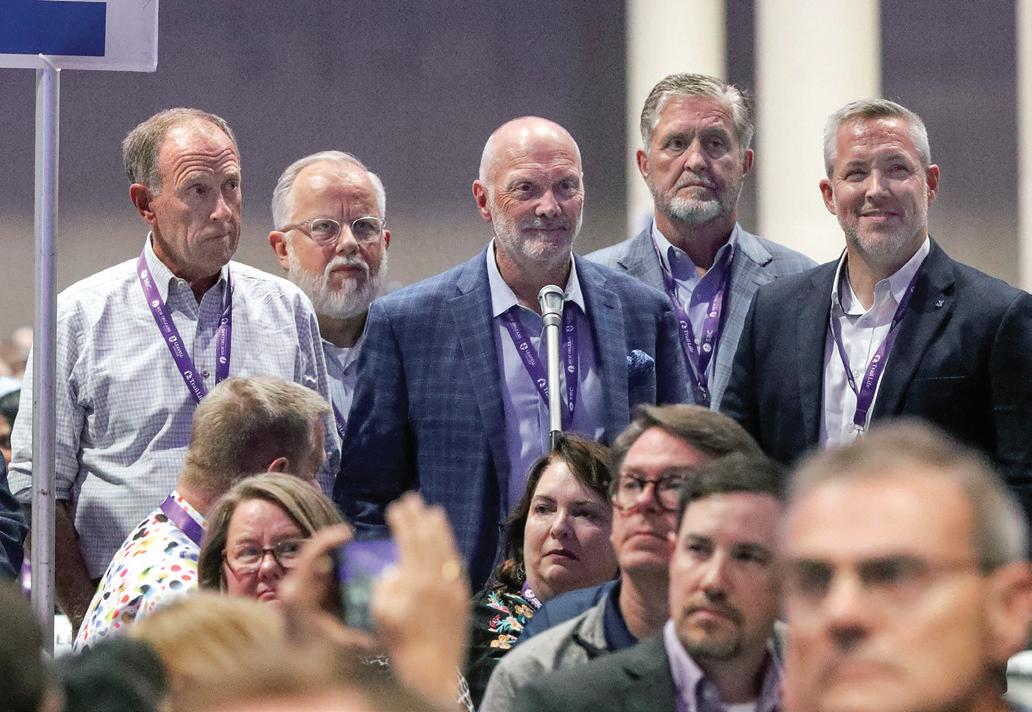
With an affirmative vote, messengers authorized Barber to appoint a study committee. They will bring a report in Indianapolis.
Back to you, EC
Interim Executive Committee President and CEO Willie McLaurin called for renewed commitment to the Great Commission and to the Cooperative Program in his report. While giving to local churches is increasing, McLaurin acknowledged a 30-year decline in percentage giving to CP: from 9.62% per church in 1993 to 4.5% today.
“While we all are searching for creative ways to do more with less, we must forge a new path forward if we are going to reverse the decline and reinvigorate our commitment to cooperative giving,” McLaurin said.
Messengers adopted the 2023–24 SBC Cooperative Program Allocation Budget of $195,250,000, and an EC/Operating budget of $8,305,500.
McLaurin continues to serve temporarily, since the nominee to take the post permanently, Jared Wellman, was rejected by the majority of EC Trustees in a May meeting that was described as bruising.
Wellman had been serving as EC chair and a member the EC’s search team. Wellman stepped down when the search team began consideration of the Arlington, Texas pastor for EC President and CEO. Trustees objecting to the process rejected Wellman’s nomination.
Vice chair David Sons took the EC chair for two months. At the EC meeting in New Orleans, Sons announced he would not run for his own full term as EC chair.
“The challenges this committee has been tasked to do have been unprecedented in Southern Baptist history,” Sons said, referring to the sex abuse investigation and tumultuous EC meetings over surrendering attorneyclient privilege during the probe.
Sons described himself as “weary” from the past three years, with “wounds that have yet to fully heal.”
Two votes for a successor to lead the EC Trustees were evenly divided. Then one of the candidates, Sons’ own nominee Russ Barksdale of Texas, withdrew. That left Philip Robertson, a Louisiana pastor who is a leader in the Conservative Baptist Network (CBN) to take the one-year chairmanship.
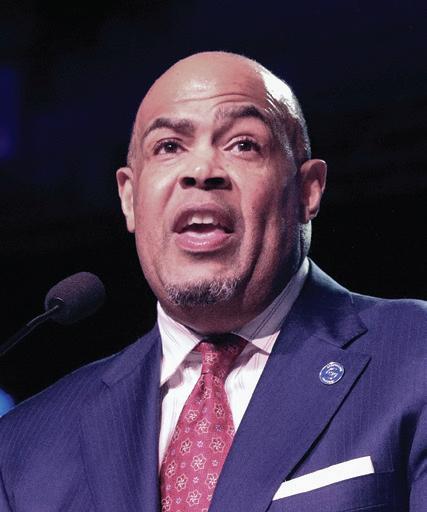
“I don’t think there’s as much encampment on the EC” as the divided vote seemed to indicate, Robertson said. “We need to seek to make the EC reliable again.”
“My heart is, whenever possible, we need to trust the messengers and let these positions be dealt with by the messengers,” he said. “My heart is to be a bridge builder.”
Even as he takes the wheel in a season of debate over women in ministry and tracking abuse claims, Robertson sounded an optimistic note. “As I tell our people, there’s a reason why the windshield of your car is 200-plus times larger than the rearview mirror. We do occasionally need to be able to look behind us, but primarily we need to look ahead of us.”
This Illinois Baptist team report was produced by Eric Reed, Lisa Misner, Kris Kell, Nic Cook, and Makayla Proctor in Springfield, and Ben Jones in New Orleans. With thanks to our reporting partners at TAB Media/The Baptist Paper and Baptist Press.
Resolutions confront today’s culture
Messengers approved all nine resolutions presented to them by the SBC Resolutions Committee. They included such topics as the Great Commission impact of women, God’s sole lordship over human conscience, the confessional heritage of the office of bishop/elder/pastor, care and support for pastors and ministry leaders, and the importance of revitalizing and replanting churches.
Three resolutions made wider comment on the current culture:
The Resolution On Opposing Gender Transition condemned “genderaffirming care” and all forms of “gender transition interventions,” calling the activities “an assault on God’s created order.”
It called on legislatures to reverse laws that support “gender transition” and affirmed legislatures that have taken action to protect children from these procedures along with supporting parent’s rights.
The Resolution On Artificial Intelligence and Emerging Technology is believed to be the first denominational statement on the ethics of Artificial Intelligence. It acknowledged the powerful potential of AI and emerging technologies.
It declared human dignity to be “central to any ethical principles, guidelines, or regulations for any and all uses” of these technologies.
The Resolution On Wisely Engaging Immigration affirmed the inherent dignity of immigrants and refugees while asking government leaders to maintain robust avenues for asylum seekers to enter the country and to take swift action to secure the border.
It said that every immigrant and refugee has inherent value, “regardless of their race, religion, ethnicity, culture, national origin, or legal status.” It also asked government officials to create both avenues for asylum seekers and a pathway for citizenship.
While asking the government to take efforts to secure the border, the resolution asked for elected officials to provide “adequate resources” for U.S. border patrol “and those working in the immigration system.” It also asked federal and state governments to work together to both protect the border and protect the dignity of immigrants while encouraging churches to share the gospel and provide Christlike care to these communities.
Abuse Reform Implementation Task force renewed for another year
Sexual abuse tracking site goes live, but work remains
“I’ve never been so happy to see a wave of yellow ballots,” pastor Mike Keahbone said after a vote extending the work of the SBC’s Abuse Reform Implementation Task Force (ARITF). “It’s so beautiful…. I’m thankful for another step towards healing. I know it’s a tiny step, but I’m thankful it’s a step.”
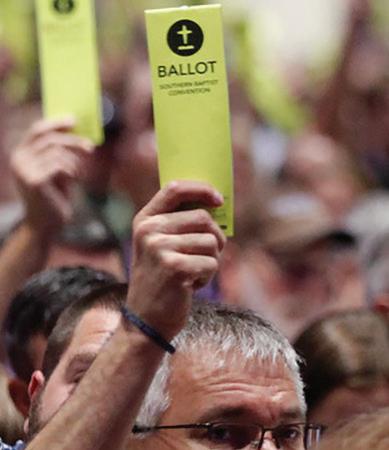
Keahbone is vice chair of the panel named last year as messengers adopted five measures to address sexual abuse in the Southern Baptist Convention. Pastor Marshall Blalock of South Carolina is committee chair.
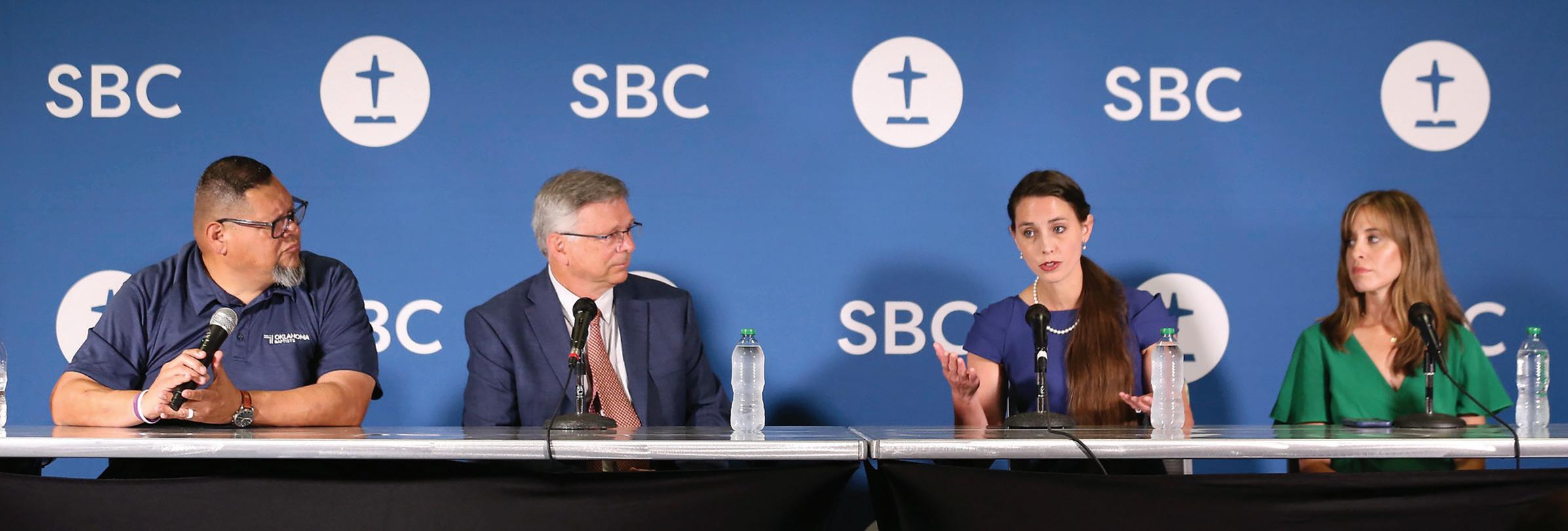
Raising their ballots at the Southern Baptist Convention meeting in New Orleans June 14, messengers agreed to give the panel another year to complete the creation of a database to track court cases, civil suits, and credible accusations of sexual abuse involving SBC church workers and vol unteers. In contrast to the 2022 adoption of the report from the first sex abuse task force, discussion was brief. Approval was again by a wide margin.
The Ministry Check website went online just ahead of the opening of the 2023 Annual Meeting, but the current data is only a placeholder for testing purposes. The actual names and cases are being verified before they are posted. The website, which contains multiple legal notices and disclaimers, may be viewed at sbcabuseprevention.com
With another year’s work completed by the 2024 Annual Meeting in Indianapolis, Blalock hopes to see a fully functional website and SBC churches engaged with the ARITF’s training materials.
“Here’s what I hope to see happen,” Blalock said. “I hope to see the database fully functioning…with credibly accused folks’ names on there, so that churches are safer next year than they are today. I hope to see the permanent home for sex abuse reform ready to go. I hope to see permanent funding for this work in place.”
The future of the ARITF was in question before the reelection of Bart Barber to a second one-year term. Barber’s opponent, Mike Stone of Georgia, did not see the need to continue the ARITF and questioned implementation of its actions for autonomous local churches. “President Barber appointed this task force, and so we were grateful that he believed in what we were doing, and he supported us every step of the way,” Blalock said. “He’s been extremely helpful to us.
“One of those major things he has stood for is execution and implementation….So, we believe his reelection creates a lot of momentum for us to take the next steps.”
Clinical psychologist Heather Evans has served with the ARITF. “I had the privilege of being with a few survivors when the website went live yesterday,” she said. “I was a little discouraged that we weren’t further along, (but) they had tears of gratitude that really humbled me and sobered me.
“This takes a commitment to culture change that won’t be done by next year’s convention and cannot be done solely by an implementation task force,” Evans said. “It has to be a commitment in the higher-up level and a commitment at the local level.”
Going forward, some additional processes will be developed for determining whether a person has been “credibly accused” of abuse before they are included in the database. “This is not creating…some kind of free-for-all, but rather, there are very defined legal standards,” said ARITF member Rachael Denhollander. “There are very defined ethical codes.”
Denhollander is a lawyer who also served on the earlier Sexual Abuse Task Force. She is also an abuse survivor who has been instrumental in developing processes for use in local churches.
“There is a trauma-informed intake process where survivor confidentiality is tightly maintained within the team that is taking those calls,” Denhollander said. The intake team gathers all information needed to address two issues: “Is this person credibly accused, and should they be going on the database?” and “Is this church in friendly cooperation?”
Names of churches will not be listed on the database, Blalock reported to messengers when one pastor told from the floor how his church had been criticized for actions by people who left the church decades ago.
At a press conference following his re-election, Barber was asked if he thought the vote by messengers on the ARITF and other issues at the meeting showed a willingness on their part to sacrifice some church autonomy. Barber responded that he didn’t believe the vote had anything to do with church autonomy. “I think messengers are saying that they want this fellowship of churches to be a fellowship of churches who do not tolerate sexual abuse, who are active in trying to prevent it, [and] who are active in trying to serve survivors of sexual abuse.”










